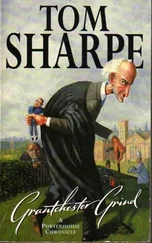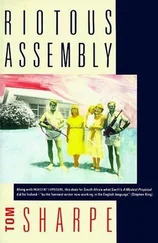Tom Sharpe - Porterhouse Blue
Здесь есть возможность читать онлайн «Tom Sharpe - Porterhouse Blue» весь текст электронной книги совершенно бесплатно (целиком полную версию без сокращений). В некоторых случаях можно слушать аудио, скачать через торрент в формате fb2 и присутствует краткое содержание. Жанр: Современная проза, на английском языке. Описание произведения, (предисловие) а так же отзывы посетителей доступны на портале библиотеки ЛибКат.
- Название:Porterhouse Blue
- Автор:
- Жанр:
- Год:неизвестен
- ISBN:нет данных
- Рейтинг книги:4 / 5. Голосов: 1
-
Избранное:Добавить в избранное
- Отзывы:
-
Ваша оценка:
- 80
- 1
- 2
- 3
- 4
- 5
Porterhouse Blue: краткое содержание, описание и аннотация
Предлагаем к чтению аннотацию, описание, краткое содержание или предисловие (зависит от того, что написал сам автор книги «Porterhouse Blue»). Если вы не нашли необходимую информацию о книге — напишите в комментариях, мы постараемся отыскать её.
Porterhouse Blue — читать онлайн бесплатно полную книгу (весь текст) целиком
Ниже представлен текст книги, разбитый по страницам. Система сохранения места последней прочитанной страницы, позволяет с удобством читать онлайн бесплатно книгу «Porterhouse Blue», без необходимости каждый раз заново искать на чём Вы остановились. Поставьте закладку, и сможете в любой момент перейти на страницу, на которой закончили чтение.
Интервал:
Закладка:
He left his car in the garage behind Phipps Building and went up to his room and presently he was sitting at his desk checking the Porterhouse Register for Cornelius Carrington’s name. There it was, 1935-8. The Dean closed the book and sat back contentedly. A nasty piece of work, Cornelius Carrington, but effective for all that. The Jeremiah of the BBC, they called him, and certainly his romantic Toryism was popular. Not even politically divisive, just good-hearted nostalgia for the best that was British and with immense family appeal. The Dean did not often watch television but he had heard of Cornelius Carrington’s programmes. “Jewels of the Empire” had been one such series, with the ubiquitous Carrington expatiating on the architectural treasures of Poona and Lucknow. Another programme had been devoted to the need to preserve the rum ration in the Royal Navy, and Carrington had made himself the spokesman for past privileges wherever they were threatened. He was, the Dean felt sure, capable of extolling the virtues of any subject you chose and certainly there was no doubting the effectiveness of his appearance. Elicit Cornelius Carrington’s interest and you were sure of an audience. And the wretched fellow was a Porterhouse man. The Dean smiled to himself at the thought of Carrington publicizing the threat that Sir Godber’s innovations posed to the College. It was a nice thought. He would have to speak to Sir Cathcart about it. It would depend on the outcome of the College Council meeting in the morning.
Skullion was at his waterpipe in the boiler-room when the meeting began. With the usual interruptions from the central heating system he could hear much of what was said. Most of the discussion centred on the cost of repairing the damage done to the Tower by Zipser’s experiment in the mass disposal of prophylactics. Sir Godber, it seemed, had very definite views on the subject.
“It is time,” he was saying, “that the College recognized the need to act in accordance with the principles which appear to have motivated the members of this Council in the past. The changes which I proposed at our last meeting met with opposition on the grounds that Porterhouse is a self-sufficient and independent college, a self-governing body whose interests are internal and without reference to the world at large. For myself as you know, that view is without foundation, but I am prepared to accept it since it appears to represent the views of the majority of this Council.” The Master paused, evidently looking round the Fellows for approval. In the boiler-room Skullion tried to digest the import of his words without much success. It seemed too much to hope that Sir Godber had changed his mind.
“Are we to understand that you have conceded that there is no need for the changes you proposed at our last meeting?” the Dean asked.
“The point I am conceding, Dean,” continued the Master, “is that the College is responsible for its own internal affairs. I am prepared to accept the views of the Council that we should not look for guidance or assistance from the public”
“I should certainly hope not,” said the Senior Tutor fervently.
“That is all I am conceding and since that is the case the full responsibility for the recent tragic events must be borne by the College. In particular the cost of the repairs to the Tower must be met out of our own resources.”
A murmur of astonishment greeted the Master’s statement.
“Impossible,” said the Dean angrily, “out of the question. In the past we have had recourse to a Restoration Fund. There seems to be no good reason why we should not set up such a fund in this case.”
In the boiler-room Skullion followed the argument with difficulty. The Master’s tactics evaded him.
“I must say, Dean, that I find your attitude a little difficult to understand,” Sir Godber continued. “On the one hand you are opposed to any changes that would bring Porterhouse into line with contemporary standards of education…” There was an angry interjection from the Dean. “… and on the other you seem only too ready to appeal to public subscription to avoid the necessary economies required to rebuild the Tower…” At this point the central heating system interjected and it was some time before Skullion could catch the drift of the discussion again. By then they had got on to the details of the economies Sir Godber had in mind. Not surprisingly they seemed to embody just those changes in College policy he had suggested at the previous meeting but this time the Master was arguing less from policy than from financial necessity.
Through the gurgles in the pipe Skullion caught the words “Self-service system in Hall… coeducation… and the sale of College properties.” He was about to climb down from his perch when Rhyder Street was mentioned. Skullion lived in Rhyder Street. Rhyder Street was College property. In the boiler-room Skullion’s interest in the proceedings taking place above his head took on a new and more personal touch.
“The Bursar and I have calculated that the cost of the repairs can be met by the economies I have outlined,” Skullion heard. “The sale of Rhyder Street in particular will provide something in the region of £150,000 at today’s inflated prices. It is slum property, I know, but…” Skullion slid down the pipe and sat on the chair. Slum property, he called it. Rhyder Street where he lived in Number 41. Slum property. The Chef lived there too. The street was filled with the houses of College servants. They couldn’t sell it. They’d got no right to. A new fury possessed Skullion, a bitterness against Sir Godber that was no longer a concern for the traditions of the College he had served so long but a sense of personal betrayal. He’d been going to retire to Rhyder Street. It had been one of the conditions of his employment. The College had provided a house at a nominal rent. Skullion hadn’t worked for forty-five years at a pittance a week to be evicted from a house that had been sold over his head by Sir Godber. Without waiting to hear more he got up from the chair and lurched out of the boiler-room into the Old Court in search of the Chef. Above his head a new violence of debate had broken out in the Council Chamber. Sir Godber had announced the proposed installation of a contraceptive dispenser.
The Dean erupted from the meeting with a virulence that stemmed from the knowledge that he had been outmanoeuvred. The Master’s appeal to principle had placed him in a false position and the Dean was conscious that his arguments against the Master’s proposed economies had lacked the force of conviction. “To cap it all,” he muttered to himself as he swept from the room, “a damned contraceptive machine.” The Bursar’s sudden change of allegiance had infuriated him too. With his support Sir Godber could manipulate the College finances as he pleased, and the Dean cursed the Bursar viciously as he climbed the stairs to his room. There remained only Sir Cathcart and already he had shown himself pusillanimous in the matter of calling a meeting of the Porterhouse Society. Well, there were others who could be relied on to bring influence to bear. “I’ll see Sir Cathcart this afternoon,” he decided, and poured himself a glass of sherry.
Sir Godber left the meeting with the Bursar. He was feeling distinctly pleased with his morning’s work.
“Why don’t you lunch with us at the Lodge?” he said with a sudden generosity. “My wife has been asking to meet you.”
“That’s very kind of you,” said the Bursar, glad to escape the hostile reception he was likely to meet at High Table. They strolled across the lawn past a group of Fellows who were conferring at the entrance to the Combination Room. In the Screens they saw Skullion scowling darkly in the shadows.
“I must say I find Skullion’s manner a trifle taciturn,” Sir Godber said when they were out of earshot. “Even as an undergraduate I found him unpleasant to deal with, and age hasn’t improved his manners.”
Читать дальшеИнтервал:
Закладка:
Похожие книги на «Porterhouse Blue»
Представляем Вашему вниманию похожие книги на «Porterhouse Blue» списком для выбора. Мы отобрали схожую по названию и смыслу литературу в надежде предоставить читателям больше вариантов отыскать новые, интересные, ещё непрочитанные произведения.
Обсуждение, отзывы о книге «Porterhouse Blue» и просто собственные мнения читателей. Оставьте ваши комментарии, напишите, что Вы думаете о произведении, его смысле или главных героях. Укажите что конкретно понравилось, а что нет, и почему Вы так считаете.












